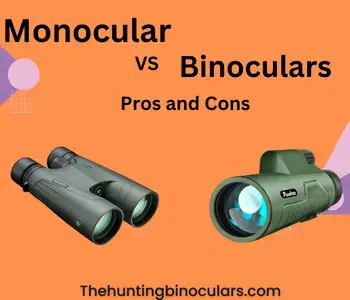
People often get confused about the difference between monoculars and binoculars, and which one is better for them. You might be shaking your brain about, what is the difference between using a monocular vs binocular pros and cons.
The main difference between a monocular and a binocular is that a monocular can only show you one image at a time, while a binocular will show you two images at the same time. This makes it easier for you to judge distances and makes it more comfortable to use.
In this blog post, we’ll go over the pros and cons of each type of binoculars and optics, as well as some factors you’ll want to consider when making your choice.
Table of Contents
- Monocular Vs Binocular Pros And Cons: Make Selection Easily
- The Pros Of Monoculars (Benefits of Using Binoculars)
- The Cons Of Monoculars (Disadvantages of Binoculars)
- The Pros Of Binoculars (Benefits of Using Binoculars)
- The Cons Of Binoculars (Disadvantages of Binoculars)
- Factors To Consider When Choosing Between Monoculars And Binoculars
- Monocular Vs Binocular Night Vision
- NIGHT VISION BINOCULARS
- Use Cases Of Monoculars
- Use Cases Of Binoculars
- Final Thoughts
Monocular Vs Binocular Pros And Cons: Make Selection Easily
When it comes to outdoor activities like bird watching, hunting, or nature walks, you have to choose between a monocular or binocular. It can be hard to decide which one is best for you, especially if you’re not sure what the pros and cons of each type are.
We’ve created this article that breaks down the pros and cons of both types so that you can make an informed decision about which one is right for you. By knowing this information, you’ll be able to make an educated decision about which type of optic is best for you.
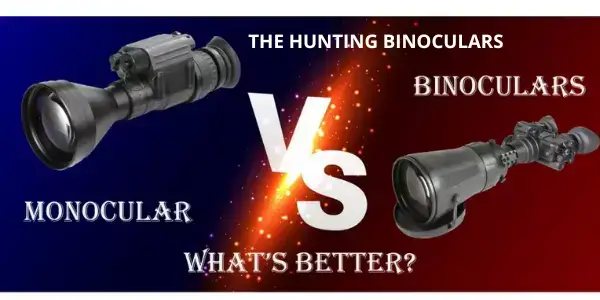
The Pros Of Monoculars (Benefits of Using Binoculars)
1. Portability and Convenience
One of the biggest advantages of monoculars is their portability and convenience. Unlike binoculars, which can be heavy and bulky, monoculars are small and lightweight, making them easy to carry around in your pocket or backpack. They’re also easier to use with one hand, leaving your other hand free to hold onto a branch or a rope.
2. Versatility
Monoculars are also versatile in their applications. They can be used for a wide range of activities, from nature observation to surveillance. They’re especially useful for activities that require mobility and quick response times, such as hunting or birdwatching.
3. Affordability
Compared to binoculars and telescopes, monoculars are generally more affordable. They offer similar magnification and viewing capabilities at a fraction of the cost. This makes them a great option for beginners or those on a tight budget.
4. Reduced Eye Strain
Using a monocular can also reduce eye strain and fatigue, especially during extended periods of use. Because you’re only using one eye, you’re not constantly adjusting your focus to accommodate both eyes, which can be tiring.
5. Increased Depth Perception
Monoculars can also improve your depth perception, allowing you to better judge the distances and sizes of objects. This can be especially useful in outdoor activities where accurate distance estimation is important, such as golfing or archery.
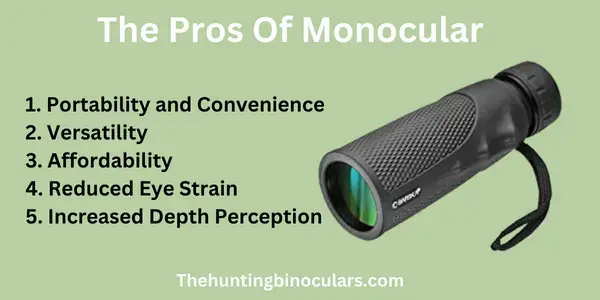
The Cons Of Monoculars (Disadvantages of Binoculars)
1. Limited Depth Perception
One of the most significant cons of monoculars is their limited depth perception. Because monoculars only have one lens, they cannot create the same depth perception as binoculars. This can be a disadvantage, especially when observing moving objects or in low-light conditions.
2. Narrow Field of View
Another drawback of monoculars is their narrow field of view. Compared to binoculars, monoculars have a much smaller field of view, which can make it challenging to track fast-moving objects. This can be a significant disadvantage for birdwatchers or hunters who need to follow birds or animals in motion.
3. Unstable Image
Monoculars can be challenging to hold steady, especially when using high-powered models. Unlike binoculars, which provide a stable image by using both eyes, monoculars rely on one hand to hold them steady. This can result in shaky images, making it challenging to observe objects.
4. Limited Comfort
Monoculars can also be uncomfortable to use for extended periods. Because they require users to hold them up to their eyes with one hand, it can be tiring, especially for those with weak wrists or hands. Additionally, using high-powered monoculars for extended periods can cause eye fatigue and strain.
5. Limited Magnification
Finally, another disadvantage of monoculars is their limited magnification range. While some models offer high magnification, they often come at the expense of image quality and stability. This can make it challenging to observe objects clearly, especially in low-light conditions.
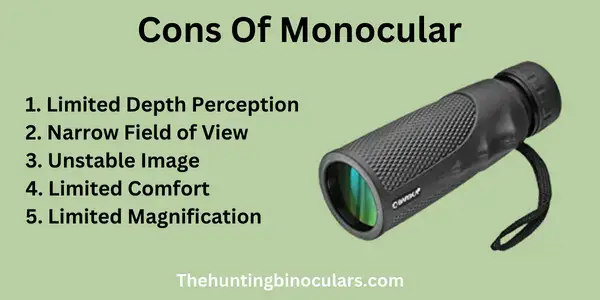
The Pros Of Binoculars (Benefits of Using Binoculars)
1. Magnification
Binoculars are designed to magnify objects in the distance, which makes them perfect for observing wildlife, birds, and landscapes. They can bring objects that are far away closer to you, allowing you to see them in more detail.
2. Portability
Binoculars are lightweight and easy to carry, making them the perfect companion for outdoor activities. They can fit in your backpack or even in your pocket, so you can take them with you wherever you go.
3. Durability
Binoculars are built to withstand harsh weather conditions, which means they can be used in rain, snow, and even extreme temperatures. They are also shock-resistant, so they can survive accidental drops and falls.
4. Versatility
Binoculars can be used for a wide range of activities, including birdwatching, hunting, camping, hiking, and stargazing. They are also useful for sports events and concerts, allowing you to see the action up close.
5. Health Benefits
Using binoculars can also have health benefits, as they can reduce eye strain and fatigue. Instead of squinting to see objects in the distance, binoculars allow you to relax your eyes and enjoy the view.
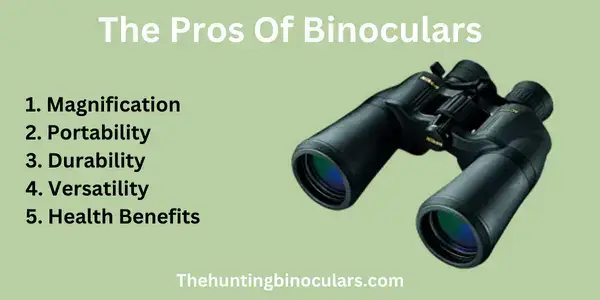
The Cons Of Binoculars (Disadvantages of Binoculars)
1. Limited Field of View
One of the main disadvantages of binoculars is their limited field of view. This means that you can only see a small area through the lenses, making it difficult to track moving objects. In some cases, this can cause you to miss important details or lose sight of your subject.
2. Heavy Weight and Bulkiness
Binoculars can be heavy and bulky, especially if you opt for larger lenses. This can make them difficult to carry around and use for extended periods, which can be a problem for people who enjoy outdoor activities that require a lot of walking or hiking.
3. Prone to Damage
Binoculars are delicate instruments that require careful handling. They are prone to damage from drops, bumps, and extreme temperatures. If you are not careful with your binoculars, you can easily damage the lenses or the casing, which can be costly to repair.
4. Limited Low Light Performance
Binoculars are not always ideal for low-light conditions, such as early morning or late evening. In some cases, you may need to use additional lighting equipment to get a clear view through the lenses. This can be a disadvantage for people who enjoy outdoor activities that require early morning or late evening viewing.
5. Expensive
High-quality binoculars can be expensive, especially those with larger lenses or higher magnification. This can be a deterrent for people who are just starting out in outdoor activities and do not want to invest a lot of money in equipment.
6. Not Ideal for Some Activities
Binoculars may not be ideal for all outdoor activities. For example, they may not be useful for water sports or activities that require hands-free movement. In these cases, other equipment such as waterproof cameras or action cameras may be a better option.
7. Requires Skill
Using binoculars requires some skill, especially when it comes to adjusting the focus and getting a clear image. For people who are new to outdoor activities or have poor eyesight, using binoculars can be challenging.
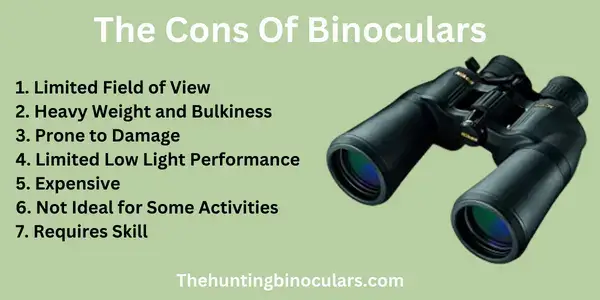
Factors To Consider When Choosing Between Monoculars And Binoculars
Now that you know the pros and cons of each type, you might be wondering how to choose between them. Here are some factors that you’ll want to consider when making your decision:
For more information on how to choose binoculars, we have already written a complete article on it.
1. How Do You Want To Use Them?
Are you going to be using your optics for bird watching, hunting, or nature walks? If you’re only going to be using them for one of these activities, then that will help you narrow down your choices.
2. What’s Your Budget?
The price of monoculars also tends to be less than binoculars, making monoculars budget-friendly. So, if you’re on a budget, monoculars might be the better choice for you.
3. How Much Space Do You Have?
Monoculars are small and lightweight. Monoculars are small and lightweight, so they’re simple to transport even if you’re going on a lengthy excursion. The properties of monoculars such as being tiny and lightweight make them easy to carry about anywhere.
Monoculars take up less room in your backpack or handbag because they are small and light. If you have limited space, monoculars might be the better choice for you.
4. What’s Your Level Of Experience?
It might be more difficult to use binoculars than monoculars. This is because you must use both eyes when viewing through a binocular. It might take some time to get the hang of it if you’re not used to using both eyes when seeing through an optic like binoculars. If you’re a beginner, you might want to start with monoculars.
5. What Are The Conditions Like?
If you’ll be using your optics in low-light conditions, binoculars might be the better choice. Because binoculars capture a broader perspective and collect more light than monoculars, they are preferred by many people.
Now that you know the pros and cons of both monoculars and binoculars, you can decide which one is right for you. Consider the usage for which you’ll be using them, as well as your budget and personal preferences. You may make an informed decision about which sort of optic is ideal for you.
Monocular Vs Binocular Night Vision
If you’re trying to decide between monoculars and binoculars, there are a few things you’ll want to keep in mind. The main distinction between the two is that binoculars provide a wider angle of view. When you’re attempting to track moving objects or get a clear view of an expansive area, binoculars will be your best bet.
Monoculars are ideal when you need a more compact option, or when you’ll be using them in low-light conditions. For surveillance, hunting, and stargazing, night vision monoculars are a fantastic option.
Binoculars have the benefit of allowing you to see through both eyes at once. This can provide a more immersive experience and help you see more detailed night vision while it can also help in reducing eye fatigue.
In the long run, binoculars are better than other vision aids because they don’t cause eye fatigue. With binoculars, you can see clearly for extended periods without strain on your eyes. When you’re trying to track moving objects or scan a large area, this is especially helpful in such scenarios.
There are a few disadvantages of binoculars, as well. One of them is that they’re big in size and heavier in weight than the monoculars. This can make them difficult to carry around with you, especially if you’re going on a long hike. Lastly, binoculars take up more room in your backpack or handbag.
Another disadvantage of binoculars is that they can be more expensive than monoculars. If you’re on a budget, monoculars might be the better choice for you. So, which should you pick? It is entirely based on your unique requirements and personal preferences.
If you need a wide field of view, then binoculars might be the better choice. If you’re on a budget or need something small and lightweight, then monoculars might be a better option. Eventually, it’s on you to decide which type of optic is most fitting for your requirements.
NIGHT VISION BINOCULARS
Use Cases Of Monoculars
Monoculars are small, lightweight, and easy to carry, making them the better choice for hiking, bird watching, and nature walks. They’re also a good choice for low-light conditions since they provide a wider field of view and gather more light.
Because binoculars need to be used with both eyes, it’s difficult to see through them. If you haven’t gotten accustomed to using both eyes in binoculars, it might take some time to get the hang of it. You may want to start with monoculars if you’re a novice. And if you’re looking for a small, lightweight option that’s easy to carry, then monoculars might be the better choice for you.
Monoculars can also be used for astronomy. Monoculars provide a larger field of view than telescopes, making them a better choice for scanning the sky at night. Besides being cheaper than telescopes and easier to step in, they are also easy to use. If you’re interested in astronomy, monoculars might be the right choice for you.
Use Cases Of Binoculars
Binoculars are a good choice for long hikes, as they are lightweight and easy to carry, so you won’t get tired of carrying them. Plus, you’ll be able to see things in the distance that you wouldn’t be able to see with the naked eye.
Binoculars are a good choice for nature walks and bird watching, as they provide a wider field of view than monoculars. They allow you to see birds up close without disturbing them.
It is better to use binoculars than monoculars for astronomy since they provide a wider field of view. By using binoculars, you can get a better look at distant objects in the night sky. With such a wide field of view, you’ll be able to see more than you would with just your naked eye.
Binoculars are also less expensive and easier to set up than telescopes. But they are generally more expensive than monoculars. Binoculars are also easier to set up, which makes them a good choice for beginning stargazers. Our research article on stargazing binoculars you can read here.
